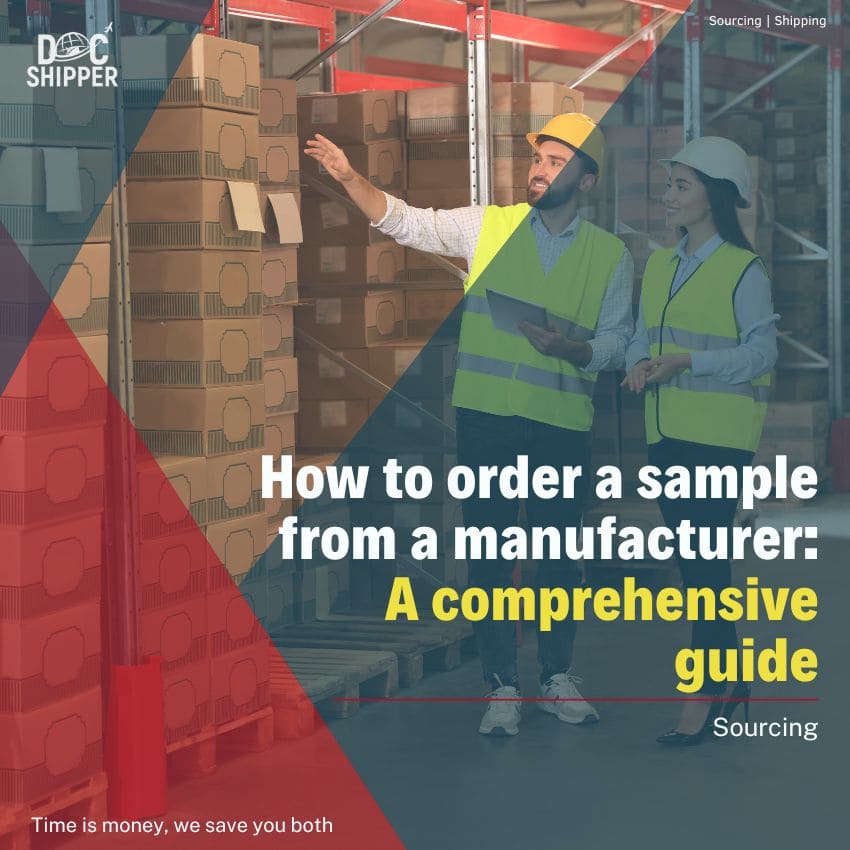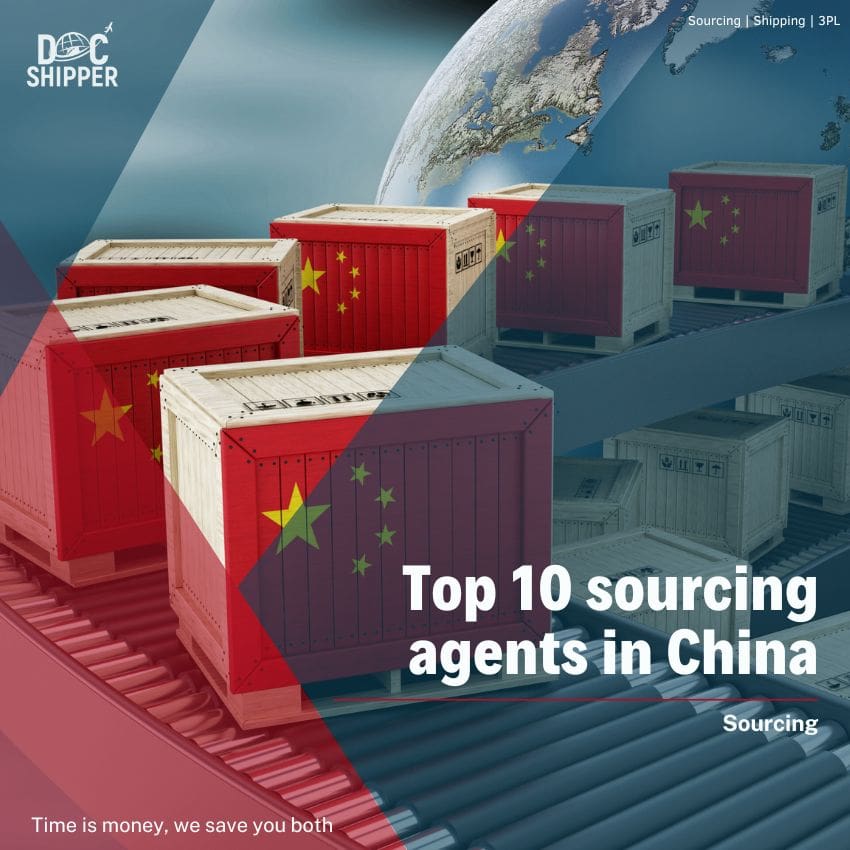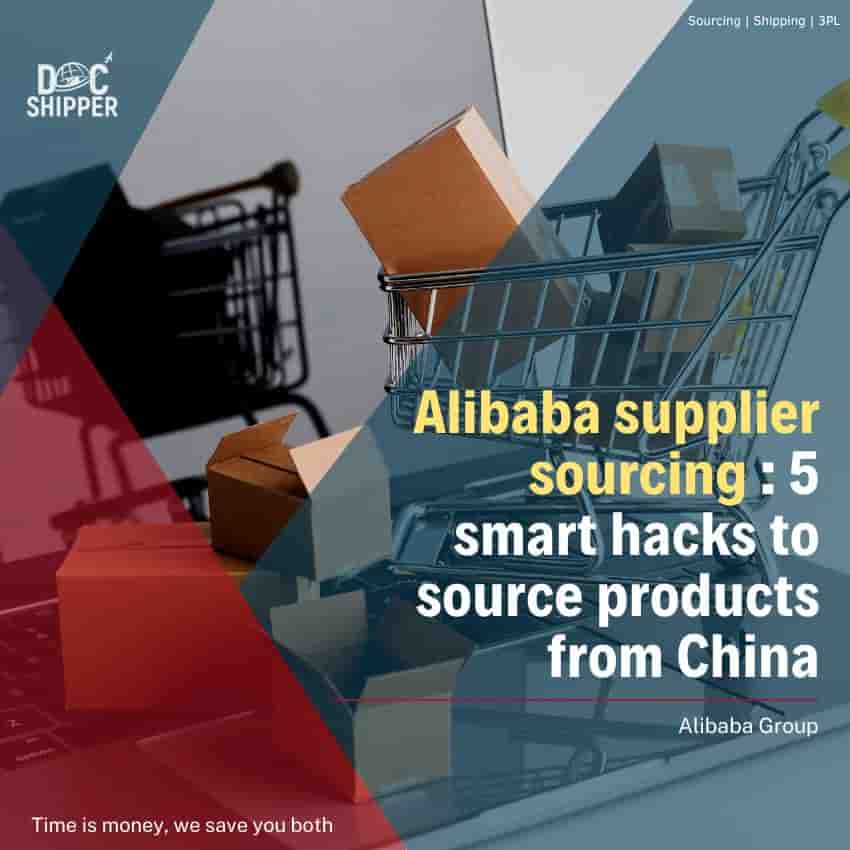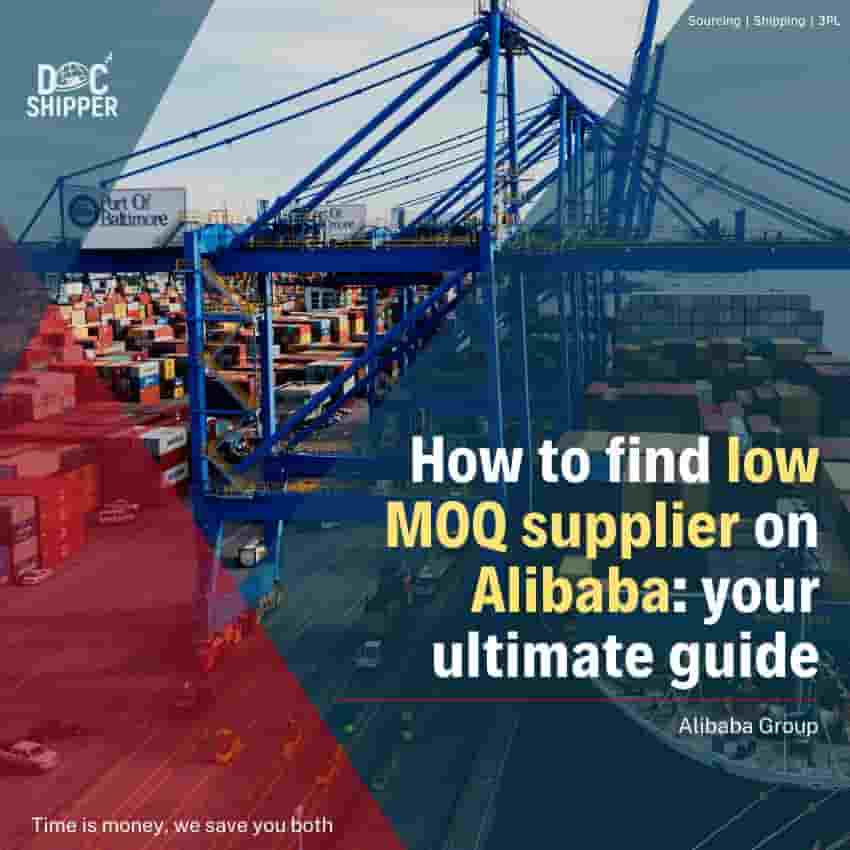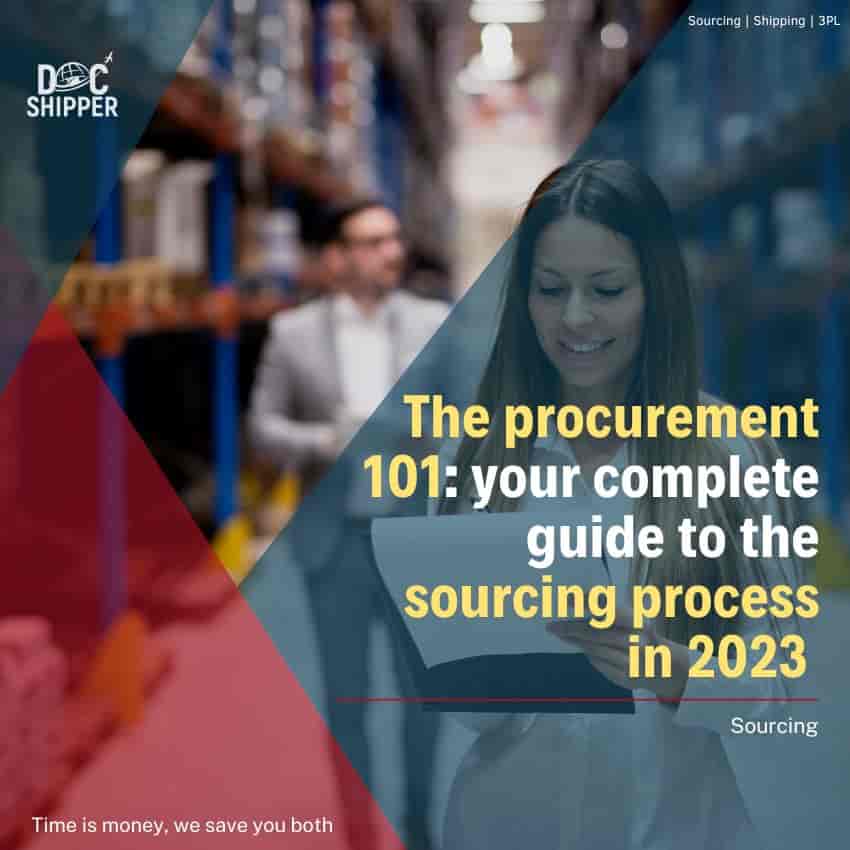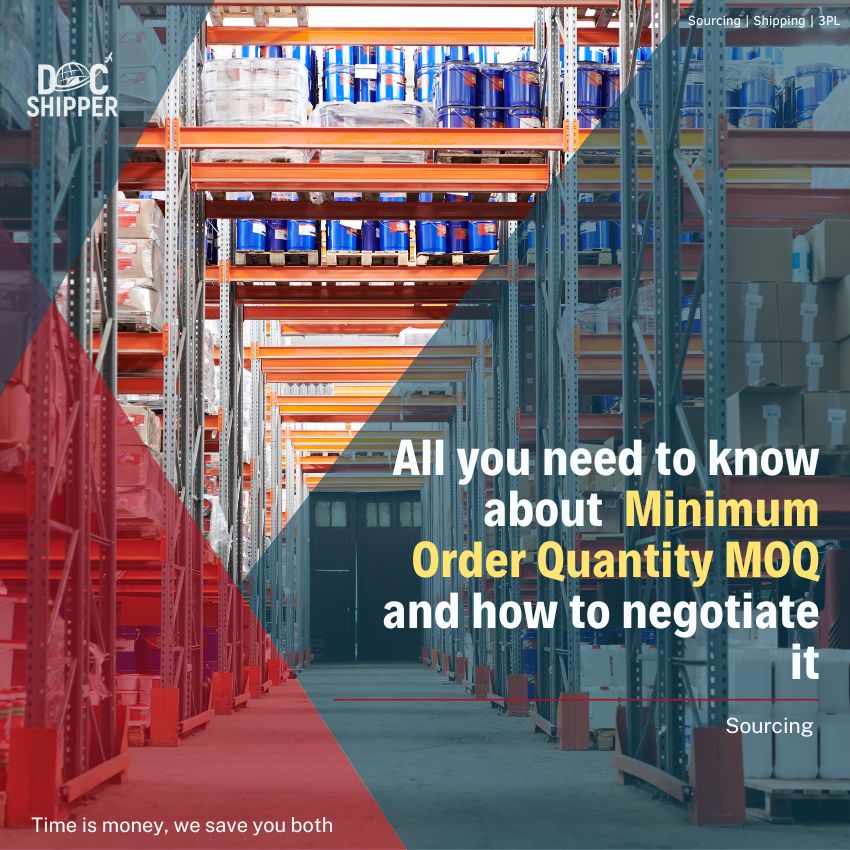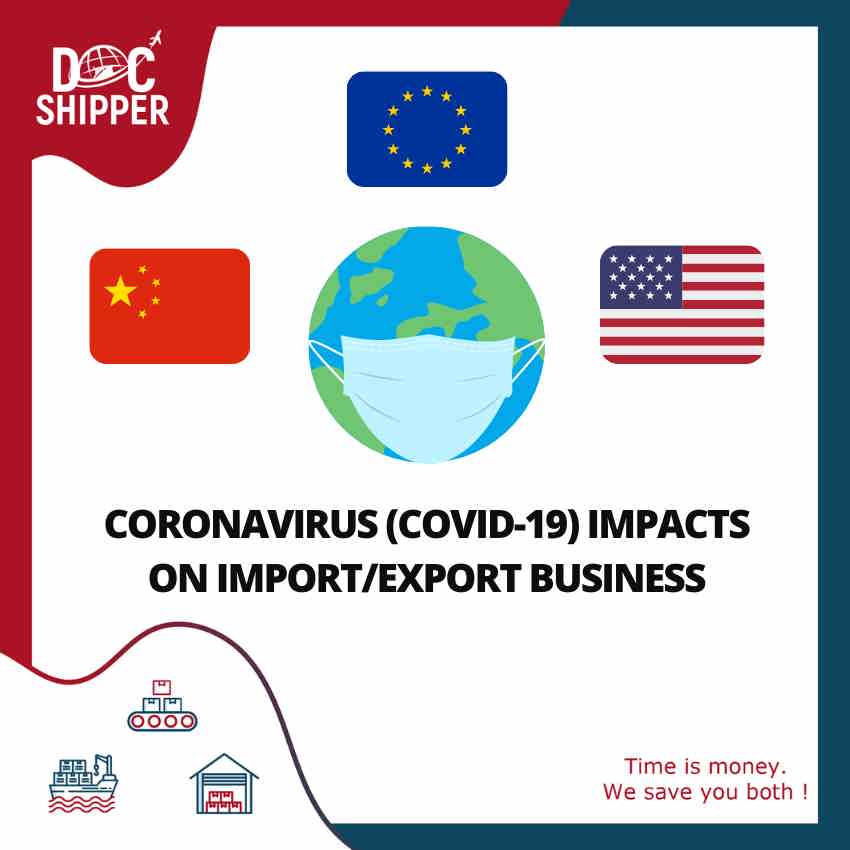Ordering a sample might be the very first thing you want to do after finding a suitable supplier. This procedure ensures that the manufacturer can provide a product that fulfills the needs of your company.
Although it is optional, the sample order process is highly recommended. Having the product in hand to check its quality, functionality, and design is essential for the rest of your logistics and commercial operations.
In this guide, you will find all you need to know about ordering samples from a manufacturer. We will review its definition, the benefits, the different types of samples, and some tips for a smooth sample order. Let’s dive into it!
What is a sample order and why order one?
A sample order is an order you place when you find a potential and suitable supplier. It contains one or a few units of an item you want to buy in large quantities from your manufacturer. This process generally occurs before the production operation begins.
While it is not a mandatory process, we recommend you not skip it: a sample order can help you minimize the risks of receiving unsatisfying products.
Benefits for the purchaser to order a sample
For the purchaser, ordering a sample is the best way to ensure the high quality of the products. In most cases, the manufacturer will expect the purchaser to pay for the production and shipment of the samples. However, some suppliers will make them for free after some negotiations, or if it is a certain type of samples.
In either case, it is always better to pay to receive a sample and evaluate it, than to skip the process and receive large quantities of a product you can’t use. Bear in mind that the cost of revisions occurring after the production process will be higher: you can avoid this situation with a sample order.
There are various benefits of making a sample order:
- Lower the risks of major revision costs
By ordering a sample, you can identify and address potential design or functionality issues before committing to a large-scale production. This simple action can save you production costs down the line since you can still make modifications at this stage of the operation. As a purchaser, ensuring that the final product meets your consumers' expectations is a priority. - Optimize logistics operations
Samples are the first step to identifying potential logistics problems, especially during the production part. While this is not always the concern of the purchaser, it is still important for the manufacturer to make sure that the Supply Chain has no problem producing flawless items. Again, identifying potential problems early on in the production operation can save both parties a lot of money. - Ensure product quality and performance
Checking the quality and performance of a product beforehand is essential for companies that focus on customer satisfaction. For some products, you will likely receive several samples. Evaluating their aspects, quality, and consistency will ensure that the final version will meet the desired standards. - Assess the manufacturer’s capabilities
The sample’s quality will also tell you a lot about your supplier’s capacity to give you the right product. It is a way to see if the person you are working with is reliable and can provide in different aspects: the quality of work, the ability to meet deadlines, and the condition of the goods upon delivery. - Gather customers feedback
Sometimes, it is in the best interest of businesses to order multiple samples as they will be tested by potential customers to gather valuable insights on how to improve the product. In this situation, sample orders are necessary and can be used to gauge market interest before launching the final version of the item.
The process of sample order does not only benefit the purchaser. As a manufacturer, having clear instructions is a time saver. Not only does this process lower the risks of product defects, but it also ensures a good relationship between both parties and helps avoid material waste.
DocShipper info : Quality control is important as it helps to evaluate the quantity and quality of goods. DocShipper assists you with all the logistics processes and provides Quality Control services. Do not hesitate to contact us via WhatsApp, or request a free quote, and one of our experts will reach out to you in less than 24 hours.
The types of samples to order
The product you need for your business will determine the type of samples you will need to order. Understanding the different types of samples and which one to order according to the situation is essential for your decision-making process. Additionally, it ensures that you will receive the perfect product in the end.
Samples can fall into two main categories: Manufacturer samples and Private Label samples.
Manufacturer samples
You can use manufacturer samples to check the capabilities of your supplier. They are usually ordered to evaluate the quality and all aspects of the product. Please note that while you can receive a high-quality sample, it does not guarantee that your supplier can produce a customized product in the future.
You can order manufacturer samples at different stages of production. First, there are the samples that you get before the production starts:
| Off-the-shelf samples, or Previous Batch samples | These are the existing samples you can order from a manufacturer to assess the product quality and aspects of past work. These items have little to no customization, so it is wise to be cautious as they may not represent the actual capabilities of your supplier. |
| Material samples | They are ordered by businesses that sell products with a certain material that they need a quality check for (e.g. cloth or wood). Material samples allow you to evaluate the appearance, texture, and durability of the material through swatches, sandwich cards, hanging samples, or other types of samples. Manufacturers do not usually charge any fee for these samples, but you might have to pay for shipping. |
| Pre-production samples | They are the supposed final version of your product that you will receive and evaluate before mass production begins. They are used to confirm the final design, aspects of the item, and last adjustments. |
Once the production starts, you can order other types of samples:
| Production samples | These are the items you receive at the early stage of ongoing production. These are used to confirm that the product perfectly complies with the needs of your business. Ordering production samples can also prevent the risks of product defects and material waste, as it is still possible to detect production defaults at this point. |
| Randomly selected finished samples | These are items that you receive at a later stage of the production run. They have a similar objective to production samples since they also allow you to confirm one last time that the products are meeting the standards of your business. |
Private label or Prototype samples
Private label samples are items made by one company but customized and sold under another brand. These samples show how the product will look with your branding and guarantee it meets your standards. You can usually obtain this type of sample with OEM (Original Equipment Manufacturers).
These products exist in various industries, but more specifically in the food, retail, cosmetics, and electronic industries.
There might be extra costs for product and packaging customizations, s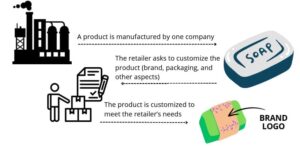
No matter the product you plan on manufacturing, it is always better to request a sample before placing a large production order. Being able to inspect the sample in person before making a financial commitment allows you to minimize the risks of major revision costs.
The main steps in ordering a sample
Ordering a sample can take weeks or even a few months, depending on the product and the modifications you need to make. Again, the cost and time this process takes are worth it, and it is a good way for the buyer to ensure that the product is adapted to the company’s needs.
There are different steps you can follow to ensure that your sample order goes as planned. For this process, you have to find a reliable supplier, select the product, check the sample policy, and then place the order. Let’s find out the details about these different steps to follow for a sample order!
Finding a reliable supplier
Working with a competent supplier who can provide good manufacturing expertise and high-quality products at a good price is the best way to boost your company’s performance. While it can take time to find the right supplier, this step is important: it has a direct impact on the profitability of your business. In today’s competitive market, finding a reliable supplier is essential as it allows you to differentiate yourself from your competitors.
Here are the things you need to take into consideration while searching for a supplier:
- The transparency of the information the manufacturer provides: looking for information should be simple, and good communication between you and a potential supplier will ensure that both parties are on the same page.
- Rely on a Q.C.D.S principle, which stands for Quality, Cost, Delivery, and Service. Through sample orders, you can assess the quality and past work of the supplier. Then analyze the prices and compare them with those of the market. You can find a way to reduce costs through negotiation and compromise, which will lead to a win-win situation. The next step is to find out if the manufacturer can deliver the products when you need them. Finally, take into account the supplier's record of pre-sales and after-sales service.
- Understanding the cost of suppliers by having a good knowledge of market prices is an advantage, as you will be able to negotiate. Note that the relationship between your company and the supplier should benefit both parties to build long-term and solid cooperation in the future.
You can either work with only one supplier or find multiple ones. In the first case, you will have a relatively stable source of procurement, but some risks come along with it: if, for whatever reason, this relation is at risk, you will have a hard time with your business. Meanwhile, if you have multiple suppliers, you can maintain your competitiveness and minimize the risks of delays or other risks.
DocShipper Alert: We are aware that finding a trusted supplier is not easy between scams, language barriers, and complications at every barn. DocShipper offers sourcing and suppliers quotation services: we can find you a reliable supplier who has the abilities to meet your expectations. Don't wait and contact our team via WhatsApp or request a free quote.
Selecting the product
Once you have found one or multiple suppliers, the next step is to select the product. As mentioned in the article, you can either request an existing sample to assess your supplier’s work quality, or give more specifications and receive an item similar to the final.
To select a product from your manufacturer, you should know the characteristics and aspects of the product you need and communicate this information to the supplier. Usually, a supplier will already have a catalog where you can identify the product that is more likely to meet your criteria. For this part, you should consider different factors, such as the price, MOQ (Minimum Order Quantities), delivery, and materials.
Checking the sample policy
Before placing the order, be sure to check the sample policy, as this one can vary according to the type of product and industry. Each manufacturer has their sample policy including the price, payment, MOQ, lead time, etc.
Understanding the sample policy of your suppliers will help you to have a clear perspective on what to expect from them. It allows good communication and comprehension for both parties.
Placing the order
After confirming the product’s aspects, and checking the sample policy, you can place your order.
You should negotiate some terms with your supplier, especially everything related to the shipment of the samples, the payment terms, lead time, and quantities. Make sure to request an invoice to have all your order details.
According to the type of products, this process will take more or less time. During shipment of the items, you should be able to monitor the order progress if your manufacturer offers a tracking service. Once you receive your order, you will need to evaluate the samples. By that stage, you should be able to decide if you want to commit to a large-scale production with the supplier.
Tips for a smooth sample ordering experience
First, you need to know that the usual price for a sample unit ranges between $35 and $100 or higher, depending on the type of product. You might be surprised by the high price of a single unit, but keep in mind that the customization of your product will be costly for your supplier for different reasons (logo design, logo mold, specific requests, etc.)
Sample orders are an essential part of the sourcing process, and doing it right can benefit you in many ways. Let’s review what you need to know for a smooth sample ordering experience.
- Do not rely on only one supplier: in most cases, it is better to have several options to choose from. Receiving samples from at least two or three different suppliers allows you to know which one is more likely to meet your expectations. Once you evaluate all the samples, you can choose the most suitable supplier.
- While the price for sample units can be high, you can always negotiate a refund for the sample fees once you place a bigger order. This will show your supplier that you consider a long-term relationship with him based on trust. However, note that you are not likely to receive a refund for the shipping costs.
- Ask for multiple samples (from the same supplier): receiving more than one sample will allow you to compare them and know if they are consistent. In other words, you will be able to see if the logo is always at the same place, or if the quality is the same, for example. Having several samples is also a good idea, as you can use them for different purposes.
- Ship your samples not by sea, but by air express: you don’t want to drag on this process, so receiving your products as fast as possible is the best way to optimize your operations. Though air express is more expensive than sea freight, the time you will save is worth the price.
- The best way to pay for samples is through PayPal: it is secure and has a good fraud detection system. If you choose another way to pay, you might face the risk of not receiving the samples.
- We advise you to order the samples per phase of production: the pre-production sample is an essential one, but ordering a sample after mass production begins is a good way to ensure that there are no product defects. That way, you can test the consistency of the product: it also allows you to compare it with the pre-production sample and see if the quality is the same.
- Once you receive multiple samples, you can perform tests, or use them to gather potential customers’ opinions and have an outside perspective. You can also test their durability and send them for quality inspection.
- Don’t forget to give feedback to your supplier on your satisfaction with the products you receive. Maintaining good communication is the key to a successful trade relationship.
DocShipper Advice : Do not overlook the sample order process. It is the easiest way for you to make sure that you do not waste time and money over defect products. If you still have concerns about which type of samples you should order, do not hesitate to contact our team via WhatsApp or request a free quote.
FAQ | How to order a sample from a manufacturer: A comprehensive guide
Why is ordering samples important?
Samples are crucial for buyers because they allow them to ensure product quality from manufacturers (even more so if they are overseas). It is better to order multiple samples from a potential supplier for several reasons: first, because the buyer can check product consistency, but also because samples can be sent to potential customers who will evaluate and give valuable feedback on how to improve the product.
How to evaluate samples?
Once you receive samples, you can proceed with their evaluation through various aspects, such as the visual, functionality, size, material quality, and consistency. The best way is to refer to the original spec sheet and make sure that the samples correspond to what is described.
Is ordering a sample a free process?
While some manufacturers might offer you free samples, a buyer generally has to pay for the production and shipping of samples, especially if the items are customized. However, the buyer can negotiate and ask to deduct this cost from the final order.
How to identify a good supplier?
You can identify a good supplier by measuring their performance, reputation, communication, lead time, and innovation. It is particularly important to find a reliable supplier, as it decreases the risks of fraud and misunderstandings. Maintaining a good relationship with your supplier is essential for a business.
DocShipper info: Do you like our article today? For your business interest, you may like the following useful articles :
DocShipper Advise : We help you with the entire sourcing process so don't hesitate to contact us if you have any questions!
- Having trouble finding the appropriate product? Enjoy our sourcing services, we directly find the right suppliers for you!
- You don't trust your supplier? Ask our experts to do quality control to guarantee the condition of your goods!
- Do you need help with the logistics? Our international freight department supports you with door to door services!
- You don't want to handle distribution? Our 3PL department will handle the storage, order fulfillment, and last-mile delivery!
DocShipper Sourcing | Procurement - Quality control - Logistics
Alibaba, Dhgate, made-in-china... Many know of websites to get supplies in Asia, but how many have come across a scam ?! It is very risky to pay an Asian supplier halfway around the world based only on promises! DocShipper offers you complete procurement services integrating logistics needs: purchasing, quality control, customization, licensing, transport...
Communication is important, which is why we strive to discuss in the most suitable way for you!

